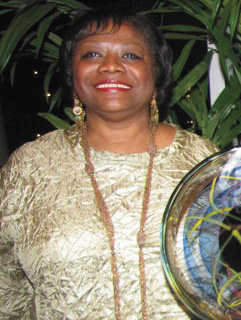At the 2010 State of Black Pittsburgh at the August Wilson Center for African American Culture Oct. 22, Esther Bush, Urban League of Greater Pittsburgh president and CEO, gave her yearly report on the dire statistics facing the African-American community and all the Urban League has done to try and change them.
| ESTHER BUSH |
“The Urban League of Greater Pittsburgh is pivotal to the socio-economic survival of African-American families and communities now more than ever in our history. Neighborhood crime, poverty, economic hardships and unsafe schools should be the exception, not the rule. Yet, 26 percent of American children, age six and younger, live below the poverty line and poor children are more likely to be victims of crime and school dropouts,” Bush said. “In a nation deemed the most powerful in the world, this is unacceptable. In a city dubbed the most livable in the nation, the increase in poverty, fueling other social ills, is unacceptable.”
The problems plaguing African-Americans in Pittsburgh are nothing new. Disparities exist in education, housing and employment, but every year the Urban League institutes new and innovative programs hoping to turn the tide.
With this year’s theme being “Building Strong Families,” Bush focused on how the Urban League helps single mothers, unfortunately those most commonly responsible for raising African-American children. She also focused on the importance of education in breaking the cycle of poverty.
“We teach our clients to not just fish, but to capture the big one,” Bush said. “For ours is a belief in the possibilities of the human spirit and the fortitude to keep on keeping on. Ours is an appreciation of the wonder and imagination of a child in our charter school as he embraces the teacher’s commitment to his excellence. Ours is the power of whole families who are no longer victims but survivors, where violence, teen pregnancy, school dropout and substance abuse is not the norm.” The U.S. Census Bureau ranks Pittsburgh higher in poverty among working-age African-Americans than any of the 40 largest metropolitan regions in the country. In 2008, more than 28 percent of the region’s African-Americans, ages 18 to 64 lived in poverty.
“Consider these facts. Last fiscal year, our affiliate served over 19,000 individuals in Pittsburgh and the surrounding counties. A snapshot of conditions affecting our clients is in stark contrast to the Allegheny County that garnered the world’s attention last year,” Bush said. “That depiction, the economy’s resilience, America’s livable city, shined brightly when Pittsburgh hosted the G-20. Yet for many of our clients there was an aching feeling of living a tale of two cities. The Pittsburgh they know, that they experience daily, is a different place.”
According to Bush, a key contributor to poverty is the more than 80 percent of African-American women who are unmarried as compared to 26 percent of their White counterparts. For this reason, the Urban League gears a large portion of their programs toward helping single mothers.
Among their other programs, Operation Home is a workshop enabling clients to make a successful transition from a renter to a home buyer. Participants are also helped with improving their credit history and developing a budget.
“One satisfied client spoke of the exemplary customer care the Urban League’s Operation Home counselor provided,” Bush said. “A homeowner now, the client credits the Urban League for this achievement, one that she says resulted in her being more confident and conscientious in decision-making. She also made a point integral to breaking the cycle—she is teaching her daughter to be financially responsible.”
Last year the Urban League launched STARs, which stands for self-sufficient, trained, active and resourceful, a one-year program providing single parents with training to negotiate with landlords, utilities and mortgage companies. STARs also provided rental assistance to prevent eviction, health and nutrition training, educational development and referrals for employment.
“Our programs are full service, for the entire family, our mission to stop the chronic cycle of poverty, one family at a time, to build hope and to motivate individuals to assume responsibility for their destiny,” Bush said. “We do not accept whining about what is not possible. We equip our clients with how to negotiate their lives toward success through positive affirmations: Yes, you can, you will, and I will show you how.”
